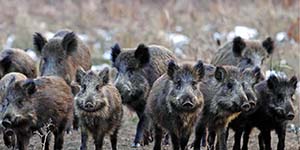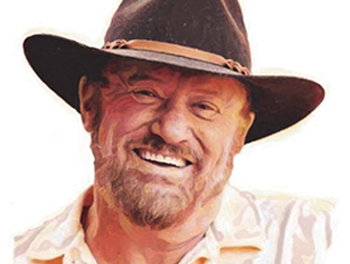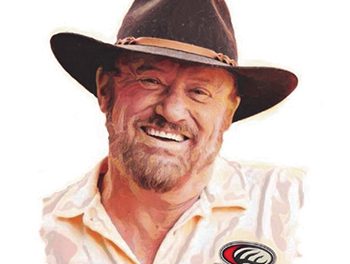
A herd of feral hogs.
Wild hogs are escaped domestic pigs and their descendants that live and breed resulting in huge numbers. If you’re a hunter or not, I’ll bet you’ve seen plenty. A mated pair, if all their offspring live and reproduce for 15 months, those two will become 108.
Pigs were first brought to the New World by Christopher Columbus and released to multiply on islands of the West Indies to provide a food supply for future explorers. This practice continued with other explorers in the 16th-17th centuries. Domestic pigs periodically escaped from farms in the South and joined feral (wild) pig populations. Their numbers today are estimated to be as high as 9 million in the United States and affect both plants and animals across Georgia.
These rascals plow up the ground with their snouts and tusks to find food, and dig up plants and the burrows of other critters. They are omnivorous, consuming virtually any type of plant or small animal they can catch. Just think of what they can do to a Wild Turkey nest. They compete with deer and turkeys for some of the same food sources too, causing many deer and turkeys to migrate away when food becomes scarce. I’ve been in the stand and recognized that both deer and turkeys are afraid of the hogs. Have I ever shot hogs? You bet. Got one in South Georgia that weighed in at just under 500 pounds. His ugly head is mounted in my “trophy” room.
Hogs can even trample, root around in and wallow in ponds and streams, polluting them for fish or for other animals to drink and introducing disease-bearing bacteria into the water that can go far downstream.
Wild hogs also do tremendous damage to farmland and other private property. In Texas, the state with the largest feral hog population, they cost farmers an estimated $50 million a year in damages.
Estimates of the total number of wild hogs in the country vary, but may range as high as 9 million with Georgia hosting as many as 600,000.
So, what do you do about it? Shoot them at every opportunity. Georgia has no closed season so have at it.
Trapping: This is a more efficient method of reducing populations because it is less time-intensive than hunting. Traps work without continual monitoring. There are many professionals that trap them by the dozens and you can find the trappers on the internet. Wild hogs are clearly a problem that requires an urgent and well-coordinated response. Now that you know more about it, be prepared to shoot and trap. I always am.
Photo: courtesy Georgia Department of Agriculture




